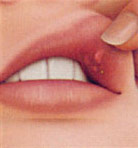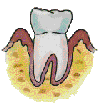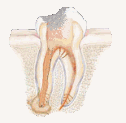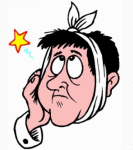
Canker Sore Pain
Canker sores , also called aphthous ulcers (aphthae), are a common form of mouth ulcers, caused by a break in the mucous membrane (mucosa) of the mouth. The condition, also known as aphthous stomatitis, is characterized by recurrent ulcers that cause pain and discomfort.
Medical treatment is usually not necessary for common aphthous ulcers. In most cases, the canker sores heal on their own in a few days to a couple of weeks, but in the mean time you may need some help to relieve the pain.
What is a Canker Sore ?
A canker sore is a shallow, painful, open sore in the mouth. They usually appear on the inner surface of the cheeks and lips, soft palate, the base of the gums and on or under the tongue. Canker sores can cause significant pain and they can make eating and talking uncomfortable.
Recurrent aphthous stomatitis is one of the most common inflammatory conditions of the mouth. About 10-20 percent of the population suffers from canker sores. Women are more often affected than men and about 30–40% of patients with recurrent canker sores report a family history. They may occur at any age, but usually first appear between the ages of 10 and 40. Canker sores usually go away on their own in 7 - 10 days.
Are canker sores contagious ?
Canker sores should not be confused with cold sores. Canker sores are not contagious, whereas the cold sores caused by the herpes simplex virus are highly contagious. Cold sores can be easily distinguished, as they usually form on the outside of mouth around and on the lips and not inside the mouth like a canker sore.
 If a canker sore persists for more than two weeks, you should see your dentist.
If a canker sore persists for more than two weeks, you should see your dentist.
In rare cases, a mouth cancer may first look like a mouth ulcer that does not heal.
Canker Sores Pain Relief - Canker sore medications
Your dentist may suggest a medication to relieve the pain and treat canker sores. Prescription treatments based on antibiotics and steroids are reserved for severe cases, and should be used only under medical supervision.
- Tetracycline suspension is a common antibiotic prescribed for severe mouth ulcers (larger than 1 cm or lasting longer than 2 weeks) that reduces the unpleasant symptoms of canker sores and speeds healing by preventing bacterial infections in the sores. (Tetracycline is not suitable for pregnant women or children before the eruption of all permanent teeth because it can cause serious discoloration of the still-forming teeth.)
- A dentist may also prescribe anti-inflammatory steroid mouth rinses or gels. Steroid mouth rinses have been shown to reduce the inflammation, pain and number of recurrences. They are reserved for more severe cases due to potential side effects. Another choice doctors have is to prescribe Aphthasol, an FDA approved treatment specifically indicated for aphthous ulcers.
- Local anesthetics, may also be prescribed for pain relief in cases of multiple or severe aphthous ulcers. Medicines, such as Anbesol, Orajel, Orabase and others, that are applied directly on the sore, might reduce irritation and relieve the discomfort of canker sores.
- Various over-the-counter pain relievers can help for temporary pain relief.
- DEBACTEROL® Canker Sore Pain Relief is another prescription only drug used for treating ulcerating oral mucosal lesions. It claims to stop oral ulcer pain, seal damaged oral mucosal tissues, and form a protective barrier after just one application.
- If it does not heal within a week, a doctor or dentist may cauterize it using a laser to burn off the ulcer, causing it to completely disappear within a few hours up to two to three days.
Home remedies for canker sore pain relief
If you want to avoid medication, there are several canker sore home treatments for reducing the pain and duration of mouth ulcers:
- Rinse the mouth with salt water.
- Rinse the mouth with a hydrogen peroxide antiseptic mouthwash (e.g., Peroxyl®), which can help significantly reduce pain and discomfort from irritation caused by food residuals and bacteria that accumulate in an ulcer, while speeding the healing process.
- As an alternative home remedy for canker sores you could mix one part hydrogen peroxide with one part water and apply it to the canker sore with a cotton swab, followed by a little milk of magnesia .
- Other over-the-counter carbamide peroxide products (e.g. Gly-Oxide®) or normal antimicrobial mouthwashes may help to relieve pain for a few hours. Mouthwashes that are too acidic should be avoided, as they could cause discomfort, at least for the first uses.
- Avoid hot, spicy or acidic foods and foods with sharp crunchy edges, such as nacho chips, which can irritate the canker sore. Acidic foods or beverages (tomato, citrus, soft drinks etc) produce a burning sensation when they come into contact with the ulcer.
- A temporary remedy for the pain of mouth ulcers is to let ice chips melt on the area of the ulceration. Although this may cause intense pain in the beginning, it is a highly effective home treatment for canker sore pain relief and it lasts for about half an hour.
- Another canker sore home remedy suggests to rinse regularly with ginger, lemon and honey tea, that have strong anti-bacterial properties.
- Keeping the ulcer dry by exposing the ulcer to the air and keeping saliva out of the ulcer for periods up to 30 minutes once or twice a day is sometimes very effective for canker sore treatment in as little as 24 hours.
- Brush your teeth gently, using a soft brush to avoid irritating the sore.
How to prevent canker sores pain
Canker sores can recur, but you may be able to prevent canker sores pain reducing their frequency by addressing some of the causes of canker sores :
- Follow good oral hygiene habits - Regular brushing (using a soft toothbrush) after meals and flossing once a day can keep your mouth clean and free of foods and bacterial infections that might trigger a sore. Regular use of mouthwash may help prevent or reduce the frequency of the sores.
- Avoid anything that could cause trauma to the mouth :
- Use always a soft toothbrush and be careful when brushing or flossing teeth, to avoid trauma to gums.
- Do not talk while chewing. You could bite the cheek, lips or tongue, triggering a canker sore.
- Be careful when eating rough or sharp foods.
- Have any irregularly sharp edged teeth repaired. Dental braces can be treated with wax to reduce the risk of wounding the cheeks.
- Watch your diet - Avoid foods that seem to irritate your mouth. These may include acidic foods or beverages, nuts or certain spices that could cause canker sores.
- A doctor may prescribe folic acid, iron, or vitamin B12 supplements if you are deficient in these. In such cases, you may require several months of therapy to improve.
- Some women may notice an increase of canker sores occurrence or severity during their premenstrual phase. An estrogen-dominant oral contraceptive may help if given for 4-6 months.
- In some cases, switching to an SLS (sodium lauryl sulfate) free toothpaste can prevent mouth ulcers.

 Dental Insurance
Dental Insurance Sensitive Teeth Pain
Sensitive Teeth Pain Tooth Abscess Pain
Tooth Abscess Pain Tooth Extraction Pain
Tooth Extraction Pain Toothache Remedies
Toothache Remedies Toothache Medicines
Toothache Medicines